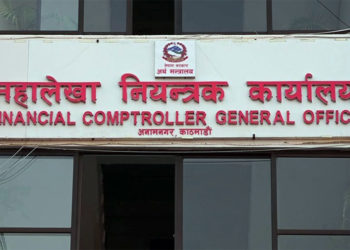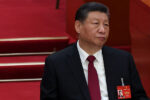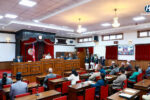KATHMANDU: Economic Digest offers a concise yet comprehensive overview of significant business happenings in Nepal, presented in easily digestible summaries.
Tuesday’s developments highlight significant economic and legislative updates in Nepal and beyond. NEPSE rose by 5 points due to heightened activity in the Hotel and Tourism sector, which surged by 58.81 points, while the Finance sector declined sharply by 54.22 points.
NEPSE closed at 2071.77 points with a trading volume of Rs 4.18 billion, witnessing increases in share prices for 151 out of 319 traded companies. Nepal’s House of Representatives passed the 2081 BS Appropriation Bill, crucial for fiscal planning.
Meanwhile, Israel announced 800 high-paying caregiver positions. Gold prices remained stable, but silver dipped slightly.
Nepal Rastra Bank’s caution against expecting flexible monetary policy due to inflation and advocacy for reduced cardamom export tariffs to Pakistan and Bangladesh underscore evolving economic strategies.
NEPSE records modest increase; Finance sector sees decline
The Nepal Stock Exchange (NEPSE) witnessed a slight rise of 5 points on Tuesday, driven largely by increased investor activity in the Hotel and Tourism sector. This sector notably surged by 58.81 points during the day’s trading session.
Conversely, the Finance sector, which had been showing steady growth recently, experienced a substantial decline, plummeting by 54.22 points in a single day.
Tuesday’s trading activities saw a total trading volume of Rs 4.18 billion, with NEPSE closing at 2071.77 points after a 5.60-point increase. A significant number of 9,435,454 shares were exchanged, with the Other sector witnessing the least decline among sectors.
Among the 319 companies whose shares were traded, 151 companies observed a rise in their share prices, while 88 companies saw a decline. The prices of shares for 8 companies remained stable throughout the trading day.
This trading session reflects a mixed performance across sectors, with notable shifts in investor sentiment towards specific industries, particularly impacting the overall market indices.
HoR passes budget for FY 2024/25 with majority
The House of Representatives (HoR) has passed the 2081 BS Appropriation Bill with a majority vote. Finance Minister Barsa Man Pun introduced the proposal for approval at Tuesday’s HoR meeting.
The government had presented the budget on May 28, and since June 11, the HoR has been discussing its contents.
This approval represents a crucial milestone in the government’s fiscal planning for the next fiscal year.
Israel offers 800 high-paying caregiver jobs
Israel has announced the opening of 800 caregiver positions with a monthly salary exceeding Rs 200,000, managed by the Department of Foreign Employment, accepting online applications for 21 days.
Applicants, aged 25 to 45, must meet criteria including height and weight specifications, education such as passing SEE and completing ANM/CMA courses or equivalent with caregiver training, and no prior Israeli work history or family employment ties. Physical and mental fitness are required.
Of these roles, 500 are primary and 300 alternate, aiming for a 60% female and 40% male distribution. The salary is 5,880 Shekels monthly, about Rs 210,000, with a five-year contract commitment.
Gold prices hold steady, silver dips slightly
Tuesday witnessed a static trend in the prices of gold in the domestic market, as reported. Fine gold remained unchanged at Rs 142,300 per tola, maintaining stability in its valuation.
Similarly, standard gold showed no fluctuation, retaining its price at Rs 141,600 per tola. Conversely, silver experienced a slight decline of Rs 5 per tola, settling at Rs 1,815 per tola today, down from Rs 1,820 per tola observed yesterday.
This observation underscores a momentary pause in the volatility typically associated with precious metal markets, suggesting a period of stability in gold prices while silver faces marginal downward pressure.
NRB Governor warns against expecting flexible monetary policy
NRB Governor Maha Prasad Adhikari cautioned against expecting a flexible monetary policy due to rising inflation, speaking at a Society of Economic Journalists-Nepal event in Kathmandu.
He emphasized that the forthcoming monetary policy will be guided by current inflation data, stressing the need for a cautious approach.
Adhikari acknowledged public expectations for simplified loan procedures but highlighted constraints faced by the central bank. He pledged NRB’s commitment to addressing genuine concerns of the private sector while discouraging baseless accusations regarding loan commissions, urging credible evidence for any claims.
Nepal urged to negotiate lower tariffs for cardamom exports to Pakistan and Bangladesh
Large cardamom traders and experts advocate for government negotiations to reduce high taxes on exporting Nepal’s renowned spice to Pakistan and Bangladesh, aiming to diversify beyond India.
Despite Nepal’s impending graduation from least developed country status by 2026, they stress the need to capitalize on potential high-value markets. Current tariffs, reaching up to 60% in these countries, hinder direct exports, while indirect routes face challenges like lengthy transit times.
Traders emphasize increasing production and quality to unlock Nepal’s export potential, projecting substantial growth if trade barriers are addressed diplomatically.
HoR approves Custom Duty Bill-2081 BS
KATHMANDU: The Custom Duty Bill-2081 BS was approved with two-thirds majority of the House of Representatives. The House approved the Bill after Minister for Finance, Barshaman Pun, responded to the queries posed by the parliamentarians on the Bill during the discussion.
Deputy Speaker Indira Rana, who presided the meeting, tabled the proposal for consideration in the meeting.
NBR sets foreign currency exchange rates
The Nepal Rastra Bank (NRB) has set the foreign currency exchange rates, detailing rates for the US dollar, Euro, British pound, and Qatari riyal for Wednesday.
As of today, June 26, the buying rate for one US dollar is 133.20 Nepalese rupees, with a selling rate of 133.80. Similarly, the Euro’s rates are set at 142.72 for buying and 143.37 for selling, while the British pound’s rates are 169.00 for buying and 169.77 for selling.
The Qatari riyal’s rates stand at 36.54 for buying and 36.70 for selling. Notably, the US dollar, Euro, and Qatari riyal remained stable, whereas the British pound experienced an increase in its exchange rate during this period.
(Compiled and prepared by Srija Khanal)
Economic Digest is a daily morning economic digest, basically relatable summations of the most important business news, and happenings from Nepal into easy-to-understand summaries.









Comment